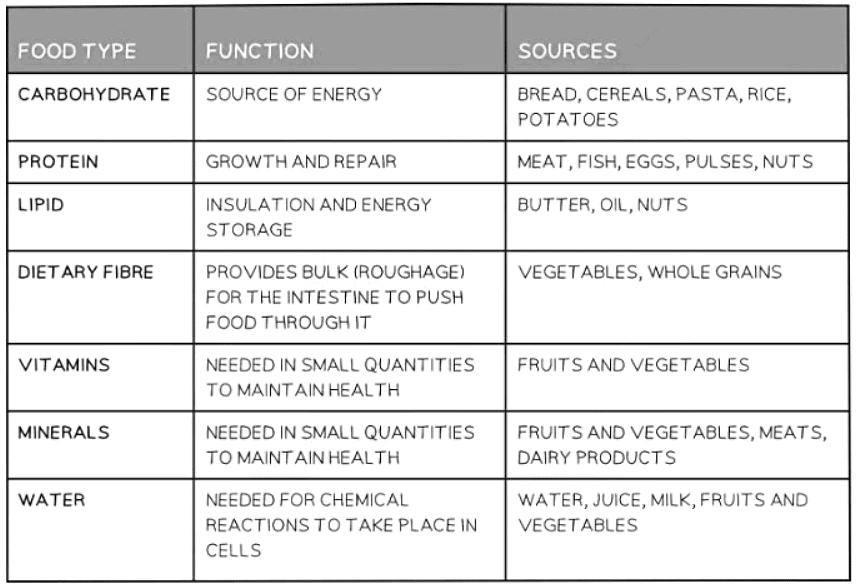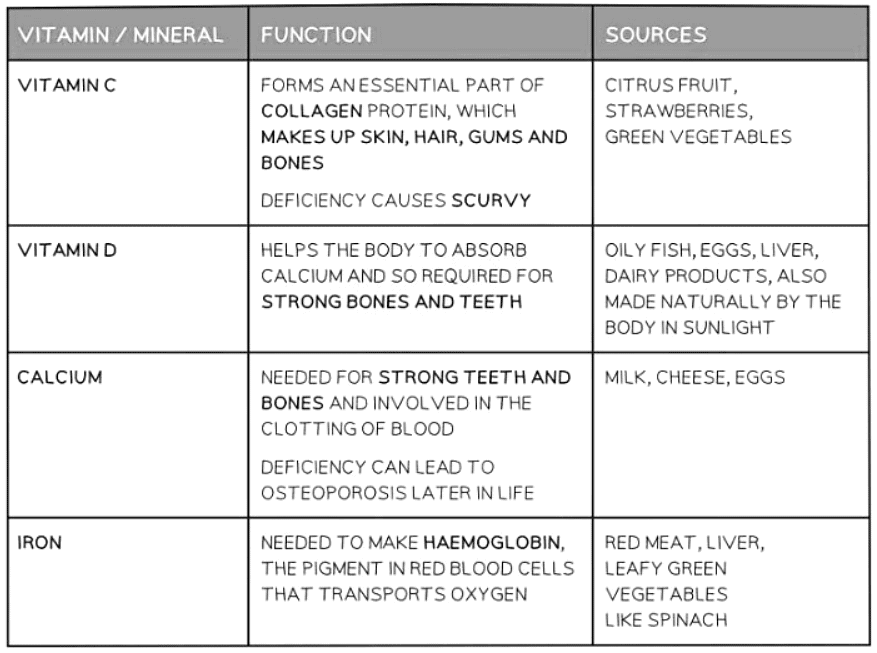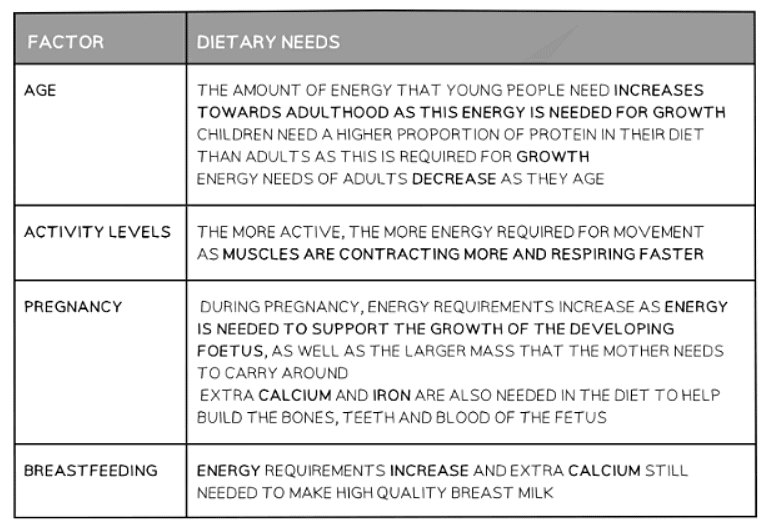Class 10 Exam > Class 10 Notes > Biology for GCSE/IGCSE > Diet & Deficiencies
Diet & Deficiencies | Biology for GCSE/IGCSE - Class 10 PDF Download
Balanced Diet
- A balanced diet includes all necessary food groups in the correct proportions.
- Essential food groups encompass:
- Carbohydrates: Carbohydrates are a vital source of energy for the body, found in foods like bread, rice, and pasta.
- Proteins: Proteins are crucial for growth and repair of body tissues, sourced from foods like meat, fish, and legumes.
- Lipids: Lipids serve as a concentrated source of energy and are present in foods such as oils, butter, and nuts.
- Vitamins: Vitamins are essential for various bodily functions and can be obtained from fruits, vegetables, and supplements.
- Minerals: Minerals are important for body structure and function, derived from foods like dairy products, nuts, and seeds.
- Dietary Fibre: Dietary fibre aids in digestion and is found in foods like whole grains, fruits, and vegetables.
- Water: Water is crucial for various bodily functions, and individuals should ensure adequate daily intake for hydration.
Food Groups Table

Vitamin and Mineral Requirements Table

Varying Dietary Needs of Individuals Table

Scurvy
- Scurvy is a severe condition resulting from a significant deficiency in vitamin C.
- This deficiency typically arises due to an inadequate intake of vitamin C for a period exceeding three months.
- Common symptoms of scurvy include:
- Anemia
- Extreme fatigue (Exhaustion)
- Spontaneous bleeding
- Pain in the limbs
- Swelling
- Gum ulcerations
- Tooth loss
- Sailors during the 15th to 18th centuries frequently suffered from scurvy, primarily due to the challenges of obtaining fresh produce during long sea voyages.
- Treatment for scurvy typically involves the administration of vitamin C supplements, either orally or intravenously.
Rickets
- Rickets is a health condition primarily affecting children, leading to inadequate bone development.
Symptoms of Rickets
- Children with rickets may experience bone pain due to poor bone development.
- They may exhibit a lack of bone growth, resulting in potential deformities.
- Soft, weak bones are common in rickets cases, further contributing to possible skeletal issues.
Causes and Effects
- Rickets is primarily caused by a severe deficiency of vitamin D in the body.
- Vitamin D plays a crucial role in the absorption of calcium, a fundamental component for bone and teeth health.
- While sunlight exposure is a primary natural source of vitamin D, certain foods like fish, eggs, and butter also contain this essential vitamin.
Treatment Options
- Effective treatments for rickets involve increasing the intake of foods rich in calcium and vitamin D.
- In cases where dietary adjustments are insufficient, healthcare providers may recommend vitamin D supplements to address the deficiency.
Question for Diet & DeficienciesTry yourself: Which food group provides a concentrated source of energy?View Solution
The document Diet & Deficiencies | Biology for GCSE/IGCSE - Class 10 is a part of the Class 10 Course Biology for GCSE/IGCSE.
All you need of Class 10 at this link: Class 10
|
101 videos|193 docs|33 tests
|
FAQs on Diet & Deficiencies - Biology for GCSE/IGCSE - Class 10
| 1. What are the main components of a balanced diet? |  |
Ans. A balanced diet should include a variety of foods from all food groups, such as fruits, vegetables, whole grains, lean proteins, and healthy fats.
| 2. How can a person prevent scurvy through their diet? |  |
Ans. Scurvy can be prevented by consuming foods rich in vitamin C, such as citrus fruits, strawberries, bell peppers, and broccoli.
| 3. What are the symptoms of rickets caused by a poor diet? |  |
Ans. Symptoms of rickets caused by a poor diet can include bone pain, muscle weakness, delayed growth, and skeletal deformities.
| 4. How can someone ensure they are getting enough nutrients in their diet to prevent deficiencies like scurvy and rickets? |  |
Ans. It is important to eat a varied diet that includes plenty of fruits, vegetables, whole grains, and sources of vitamin D and calcium to prevent deficiencies like scurvy and rickets.
| 5. Can a balanced diet alone prevent all deficiencies related to diet? |  |
Ans. While a balanced diet is essential for overall health, some deficiencies may still occur if certain nutrients are lacking. It is important to consult with a healthcare provider or dietitian to ensure all nutrient needs are met.
Related Searches
















